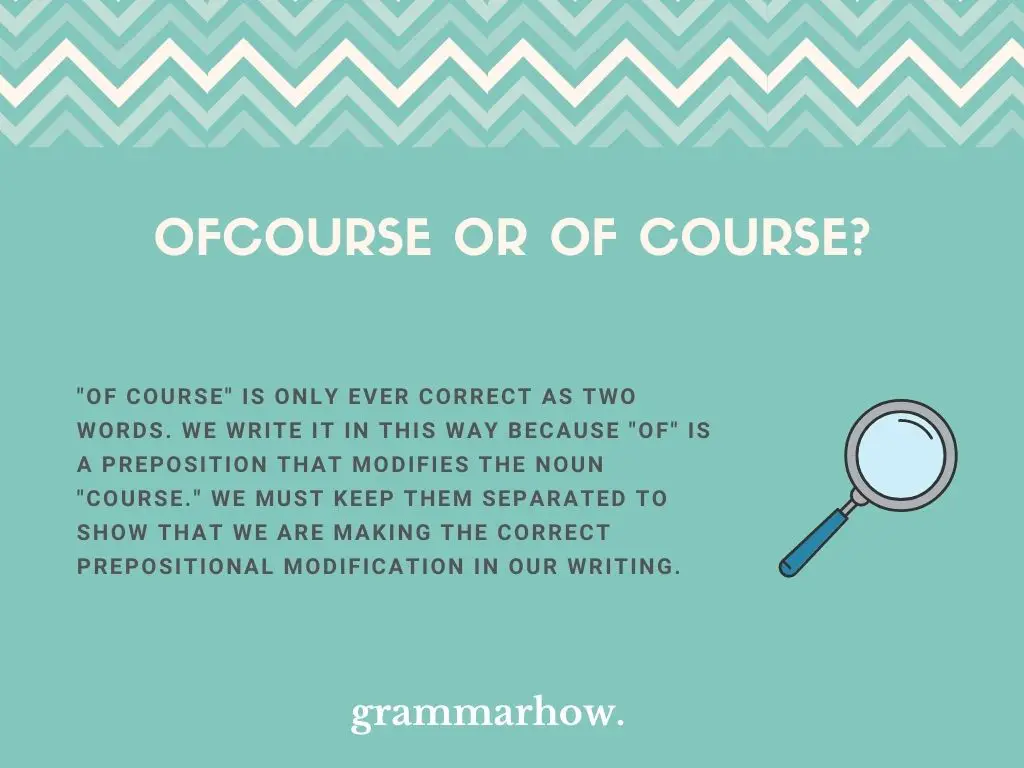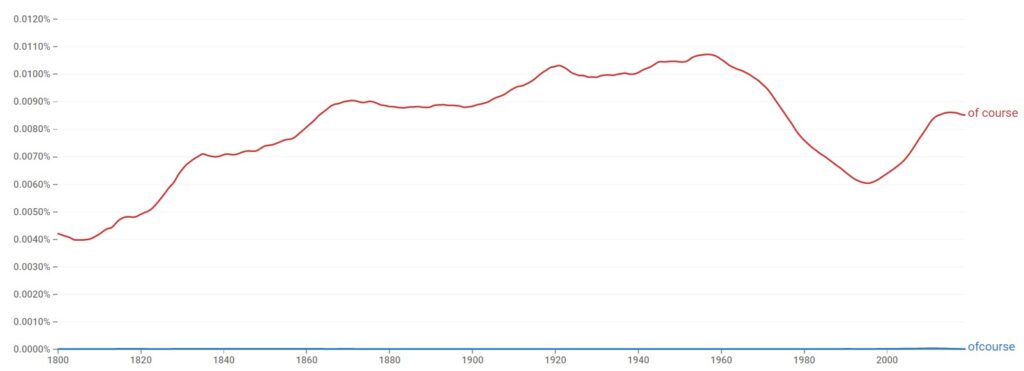“Of course” is a great way for us to say yes to something or show agreement. However, some people get a little confused about whether it’s one or two words. Luckily, this article is here to help you understand the reasoning behind its spelling.
Ofcourse vs. Of course
“Of course” is only ever correct as two words. We write it in this way because “of” is a preposition that modifies the noun “course.” We must keep them separated to show that we are making the correct prepositional modification in our writing.

According to Google Ngram Viewer, “of course” is by far the most popular choice of the two. This clearly shows that it’s the only grammatically correct choice, and it’s the one you should stick to writing whenever you want to be correct.

There is almost no usage of “ofcourse” as one word, which shows that it’s wrong.
The Oxford Dictionary and The Cambridge Dictionary provide entries for “of course.” They explain all the different ways we can use the phrase in English, and each way provides examples that show it’s correct as two words.
“Ofcourse” is never mentioned in the dictionaries. That’s enough evidence to show that it’s never correct.
Is “Ofcourse” One Word?
“Ofcourse” is incorrect. We simply cannot group the words in this way when we want to show we agree with something. Some people think it works informally because of the text abbreviation “ofc,” but this does not apply in standard English.
To make sure we get it correct, we can refer to the AP Stylebook. The rules inside the AP Style guidelines teach us that we should only group words when they’re commonly hyphenated together and modify another noun or verb.
Since “of course” does not modify a noun or verb, we cannot use it as a one-word spelling. It does not need to be grouped in this way because we must treat the preposition separately from the noun.
These examples should give you a much clearer understanding of it:
- Correct: This is, of course, strictly between us. I do not want to hear that this has managed to get back to anyone else.
- Incorrect: Ofcourse, I can’t be responsible for what happens to you if you decide to go through with this, okay?
- Correct: Of course, you’re not alone! I’ll be here for you whenever you call upon me. Just let me know when I’m needed.
- Incorrect: I find that difficult, ofcourse. But, I still do my best to make sure that I get it right when I have to.
Is “Of course” Two Words?
“Of course” is two words. There is no other way to spell it. It’s a common phrase in English, and we must keep the preposition separate from the noun form. As long as we remember to do this, we will always be able to write it in a grammatically correct format.
There are no rules that work in English that allow us to group “of course.” It cannot be hyphenated, and it cannot be one word.
Prepositions like “of” might be small, but they profoundly affect certain words, and we need to show this effect by keeping them separate.
Perhaps you’d like to check out these examples to see which is the correct form:
- Of course, you’re free to stay here for as long as you’d like. I won’t try to kick you out.
- I didn’t think much of it, of course. Though, now that you’ve mentioned it, I would like to understand more about it.
- Of course, you thought you were alone! Alas, here I am, and I’d very much appreciate an explanation as to why you’re here.
- Of course, I agree with you! I think this is a really important matter, and we must do something about it before it’s too late!
Tip To Remember The Difference
Finally, it’s time to check out a quick tip. If you can remember this tip whenever you write about “of course,” you’ll never get it wrong again.
“Of” is a designated preposition. We use it when it’s linked to a name or entity. With the phrase “of course,” we can treat “course” as the name in the phrase. It’s always appropriate to write “of course” with a space to make sure we are using the preposition “of” correctly.
You may also like: “Of Course” – Easy Comma Guide + Examples (All Variations)

Martin holds a Master’s degree in Finance and International Business. He has six years of experience in professional communication with clients, executives, and colleagues. Furthermore, he has teaching experience from Aarhus University. Martin has been featured as an expert in communication and teaching on Forbes and Shopify. Read more about Martin here.

